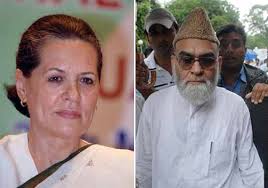
“We generally, in such matters (Sonia’s meeting with Shahi Imam), will take cognisance on the receipt of complaint. We should be awaiting that,” he told reporters here.
Mr Sampath, who was replying to a question at a press conference here with regard to BJP’s demand for a sou motu cognisance of Sonia-Imam meeting on April 1, said, “As soon as it is received, we will definitely examine and further action would be taken.”
Taking strong objection to Ms Sonia’s appeal to Muslim leaders to ensure their votes are not split, BJP yesterday termed it is a violation of the Model Code of Conduct and asked the Election Commission to take suo motu note of it.
The principal opposition party also accused Congress of playing communal politics and dubbed the ruling party as “pseudo secularist”.
“This is absolute communal politics on display. This is absolutely unacceptable. This is also a violation of the Code of Conduct also because you cannot appeal to voters on the basis of religion and caste. We expect the Election Commission to take suo motu cognisance of this appeal,” BJP spokesperson Prakash Javadekar had said yesterday in Delhi.





Comments
Add new comment